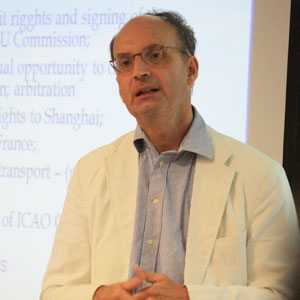Information
Venue
Start
End
24 August 2012 | Coffee Hour Talk
The European Union’s Convulsive Attempts to Control Aviation Emission: Staggering directions on an attenuated legal basis
Introduction

Emissions must be controlled as the global environment is requesting this. Worldwide agreements have been concluded to that effect. Emissions coming from stationary installations can legally be capped in a relatively easy way. This is different for emissions produced by moving objects like aircraft as they transit jurisdictions. The EU has made a dubious attempt to control emissions produced on flights which have a marginal link only with the area and the persons to whom the environmental measures are addressed. This attempt caused frictions.
The following questions were addressed:
- The need to control aviation emissions;
- The worldwide framework designed to protect the environment;
- The regulator framework for aviation;
- A regional effort to reconcile the global framework with local policy objectives;
- The position of airlines;
- The role of the regulator and of the Court of Justice of the EU;
- Challenges pertaining to the regional efforts to control emissions;
- How to proceed from here?
It was concluded that the panacea for the way forward is written down in the Preamble of the Chicago Convention on international civil aviation of 1944:
“… it is desirable to avoid friction and to promote that cooperation between nations and peoples upon which the peace of the world depends; … that international civil aviation may be developed in a safe and orderly manner and that international air transport services may be established on the basis of equality of opportunity and operated soundly and economically;”
That message is still applicable, even after nearly 70 years. The world changes but basic principles and concepts survive. These are a few of them.
About the Speaker
Prof Pablo Mendes de Leon is Professor of Air and Space Law and Director of the International Institute of Air and Space Law of Leiden University, which is one of the leading international scientific research and teaching institutes in the world, specialised in legal and policy issues regarding aviation and space activities. The Faculty of Law of Leiden University founded the institute in 1986. In addition to his duties as Director of the International Institute of Air and Space Law of Leiden University, Pablo Mendes de Leon maintains a vast range of memberships in organisations that work to combine law and practice of aviation law and policy. For instance, he is President of the European Air Law Association, Visiting Professor at the National University of Singapore and the University of Bordeaux, France, a judge at the District Court of Haarlem, a Fellow of the Royal Aeronautical Society, Membre titulaire de l’académie de l’air et de l’espace, Toulouse, France, a member of the International faculty of IATA, a Board Member of the magazines Air and Space Law, Journal of Air Law and Commerce and the Italian ANIA Insurance Newsletter and the Director of the Series of Publications in International Aviation law and Policy with Kluwer Law International.
Presentation
To download Prof Mendes de Leon’s presentation in PDF format, click here.


